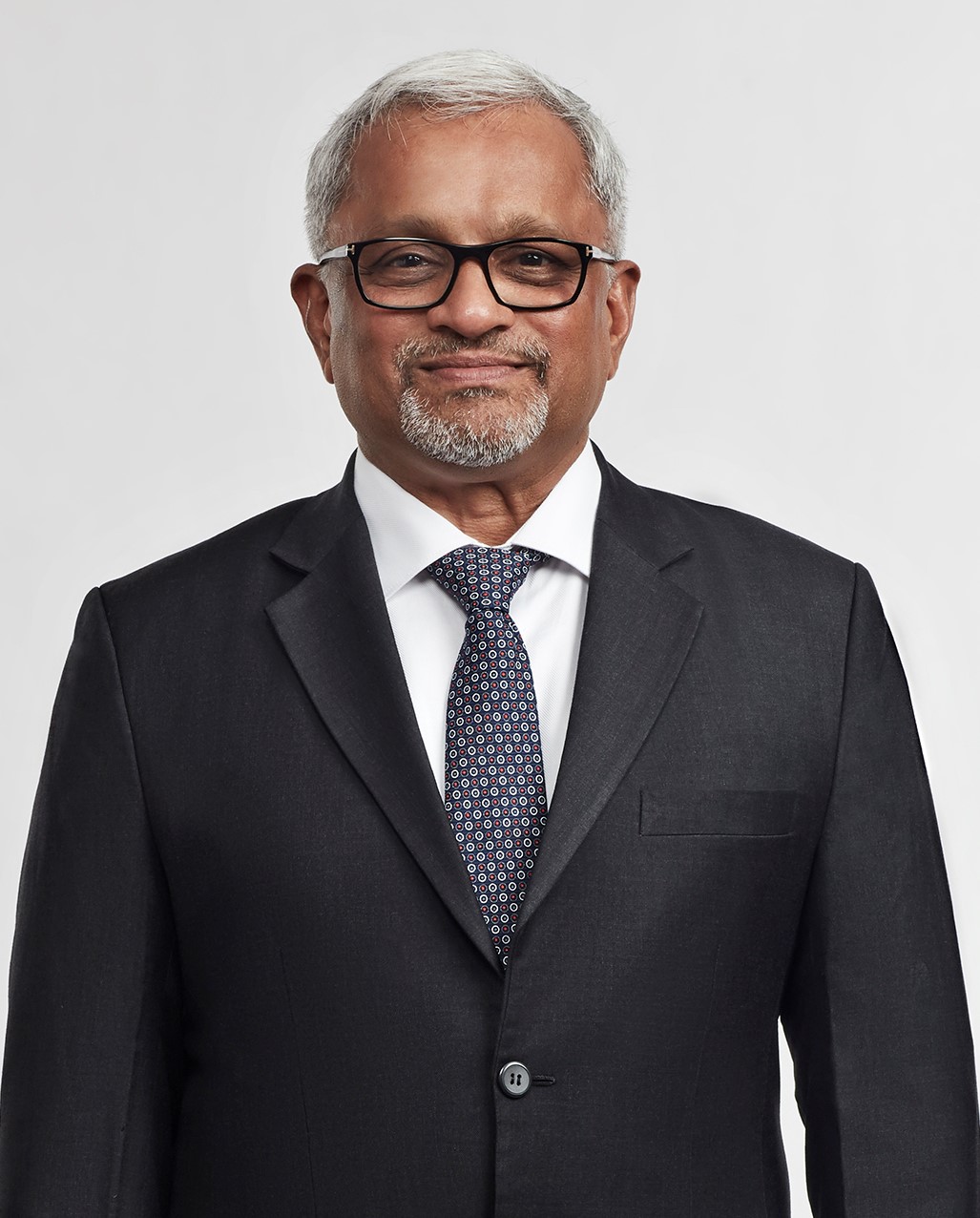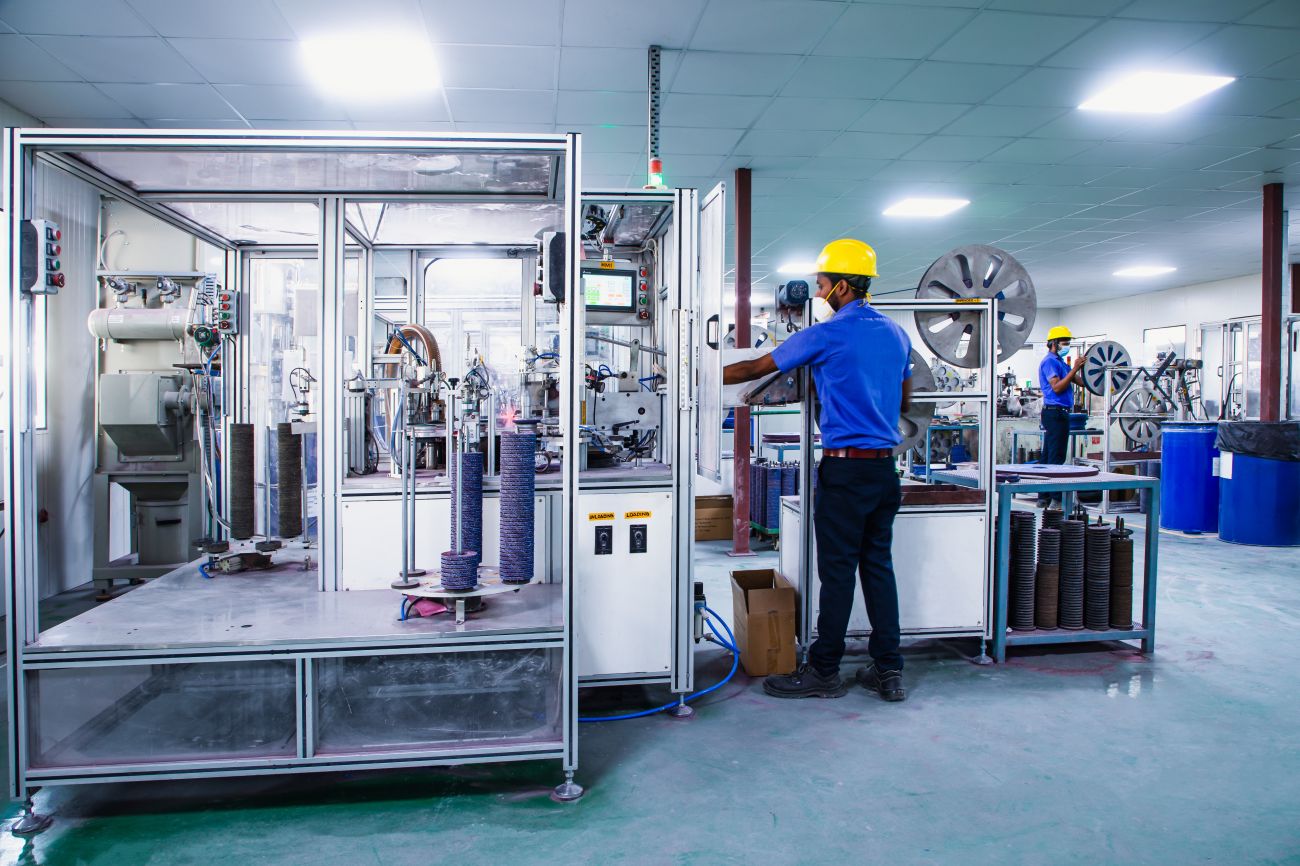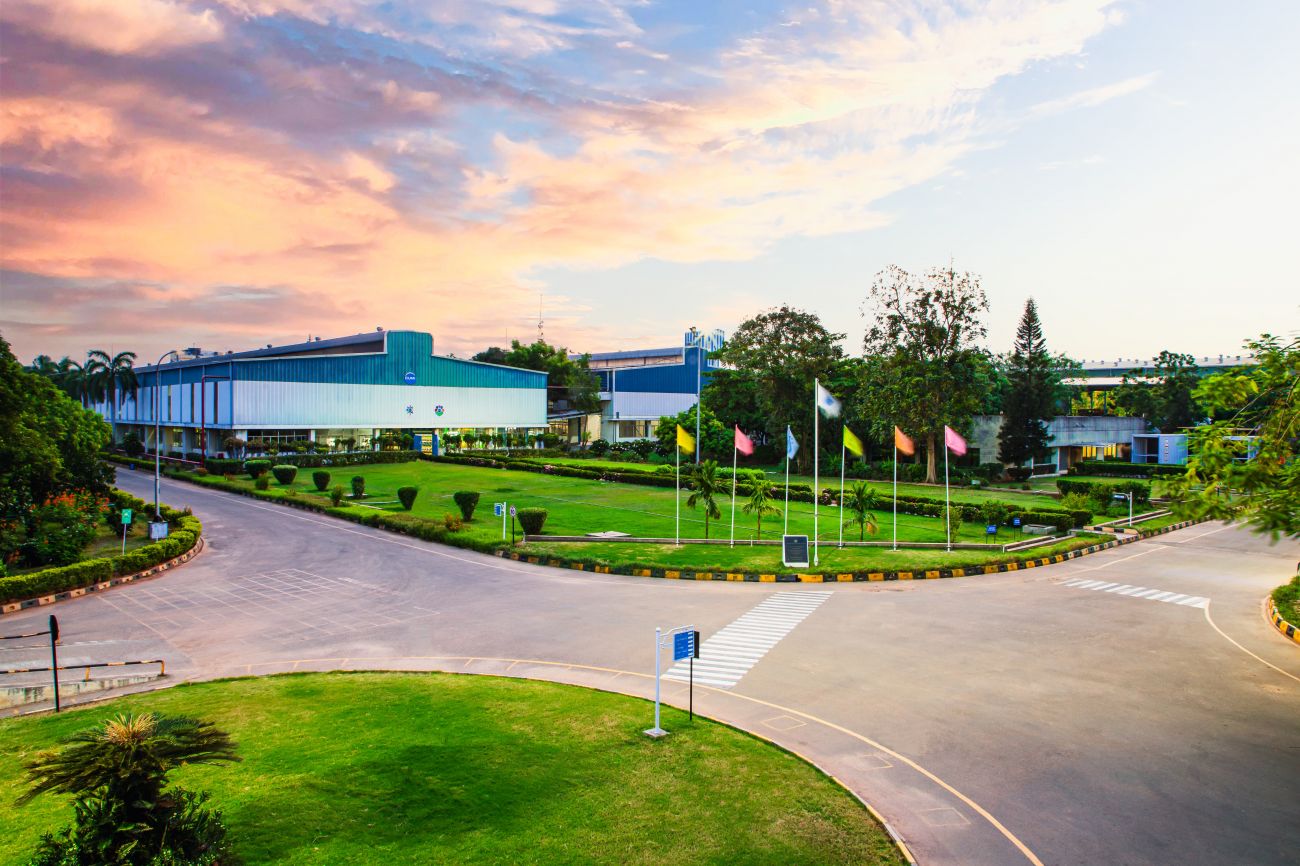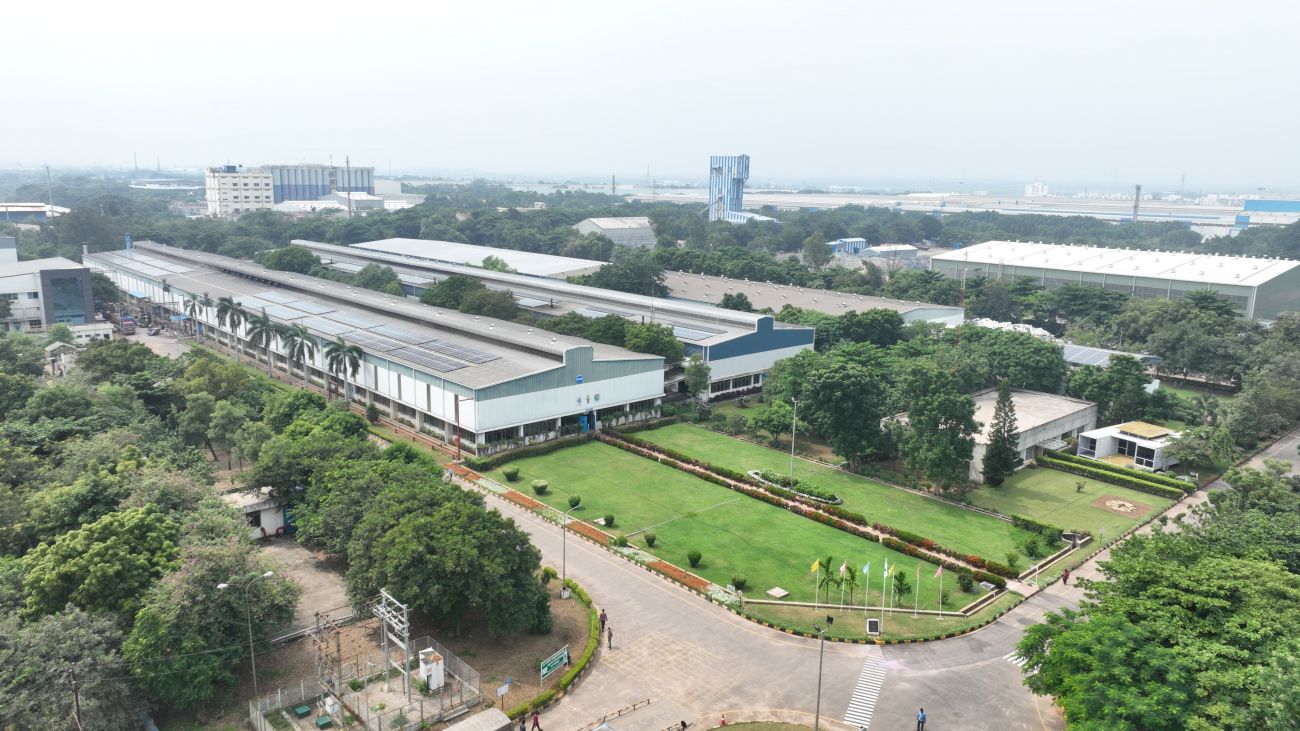COMMITTED TO ‘MATERIAL LEADERSHIP'

In the following interview with Soumi Mitra, Editor-in-Chief of MMI, Ananthaseshan Narayanan, Managing Director, Carborundum Universal Ltd (CUMI), a leading materials science solutions provider, discusses the company's vision and mission, its strengths, competitive strategies, growth partners, his perspective on the capabilities of Indian machine tool builders, and the necessary measures they should take to enhance their game.
Please tell us about the history and mission of Carborundum Universal Ltd (CUMI). How has CUMI evolved and adapted to changes in the abrasives, ceramics, and electro-minerals industry over the years?
Ananthaseshan Narayanan: CUMI started as a tripartite joint venture between Carborundum, USA and Universal Grinding Wheels,UK, in 1954. We started as an Abrasives company, pursuing only one material property, which is the hardness of Silicon Carbide while producing sand papers and grinding wheels. Over the years, as we pursued a lofty goal of how we can pursue sophistication, we integrated across the value chain while also developing an enormous strength in application engineering and formulations. This allowed us to expand our materials portfolio, the properties we harnessed, and the industrial applications we could address. As we step into the seventh decade of our journey, we are now a leading materials science solutions provider present in over 6 continents with a business and portfolio that caters to the needs of the world, both the current and future.
Can you walk us through some of the key products or services that CUMI offers and their applications in various industries?
In the Abrasives segment, CUMI manufactures a full range of abrasives, from coated abrasives, vitrified bonded abrasives, resin bonded cutting and grinding wheels, and super abrasives. These are used extensively in applications like general engineering, auto components, food processing, wood and metal working, defence, and aerospace.
In the Electrominerals space, CUMI is among the largest manufacturers of synthetic minerals like aluminum oxides and silicon carbides. These are the major input minerals in the manufacture of abrasives, refractories, and blasting of surfaces.
Our Industrial Ceramics products generally address the wear requirements of mining applications, power generation, distribution, and transmission. These products also find use in chemical equipment and pumps and as substrates and components in semiconductor manufacturing.
Super Refractories are engineered materials in aluminum oxide and silicon carbide that address high heat resistance requirements in iron and steel making, glass, ceramics, cement, carbon black, fertilizers, and chemical process industries used in kiln furniture or furnace linings.
How does CUMI prioritize innovation and R&D to stay ahead of competitors in the industry?
The innovation mindset and application engineering is in CUMI’s DNA. What we’ve been good at is working with customers, understanding their problems, and translating their problems into possible solutions. We then work with customers, academic institutions, and in our 8 DSIR-approved laboratories to develop new products, services, and solutions that address customer problems. In 2018, one such solution – metallized vacuum cylinders – won the CSIR Diamond Jubilee Technology Award. This is a recognition that we are an Indian company creating products made in India and sold globally.
At CUMI, we firmly believe that competition is good. But, we don’t focus too much on competition. What we are committed to is ‘material leadership’, keeping our focus on what is possible with materials. We are energized when we work with customers to discover possibilities for them. Through that, we enrich them and ourselves. That is one way of keeping ahead of the competition.
How does CUMI prioritize talent development and retention within the company, and what initiatives has the company undertaken in this regard?
Our journey to becoming a globally admired materials science company would not be possible without building the capability of people. We have an intensive program to consciously pick graduate engineers, support their year-long induction, and then support their transition into positions that interest them or where the company requires them to work.
As people grow within the organization, we have a formalized system – the CUMI Leadership Programme (CLP). Through this program, we identify bright sparks and train them to expand their mindset to manage larger teams.
Further, we have the Business Leadership Programme (BLP) which is for senior leadership. As most of us are engineers and not MBAs, so as one grows up the ladder we also need to have those management inputs. The BLP leads to a pool of talent that can run companies over time.
|
In the Abrasives segment, CUMI manufactures a full range of abrasives, from coated abrasives, vitrified bonded abrasives, resin bonded cutting and grinding wheels, and super abrasives. These are used extensively in applications like general engineering, auto components, food processing, wood and metal working, defence, and aerospace. |
We also sponsor specialized training programs like Fulbright scholarships and even sabbaticals for technical colleagues to pursue their PhD programs while they continue to work.
How has CUMI addressed challenges related to sustainability and environmental impact in its operations and products?
Across the segments we operate in, we are consumers of large amounts of energy. Since we deal with mineral processing, there’s dust and a certain amount of waste. We, therefore, took a target of becoming a much cleaner, more responsible production site across the world. We are primarily looking at reducing the intensity by 25 percent in the following 4 areas – energy, emission, water, and waste – by the year 2025. Towards this, each operation has laid down plans and projects in place which has over the last three years resulted in a significant reduction. We produce 100,000 tonne of silicon carbide in Russia and it is one of the cleanest factories. Similarly, in Kerala, we have been receiving awards from the State Government for energy, water conservation, and environmental cleanliness. We will continue on this journey to make a material difference not only to what we do at work but also to communities and our customers.
Can you discuss any notable partnerships or collaborations that CUMI has undertaken to enhance its offerings or expand its reach?
CUMI was born out of a tripartite joint venture. Through our journey, we have nurtured very deep relationships with global leaders. Some of our early joint venture partners were Morgan thermal ceramics of the UK to make ceramic fibers. Subsequently, when we grew outside the country, we acquired companies. Our largest manufacturing acquisition for the Murugappa Group is a company in Russia, which is possibly the single largest producer of silicon carbide in the world. Later, we did a technology transfer from Coorstek, Denver, for ceramic lining for wear resistance. We have other partnerships across the world in South Africa Foskor Zirconia, and joint venture partnerships in Australia. Recently, we also acquired two companies in Germany – RHODIUS Abrasives and AWUKO Abrasives. Both of them are leaders; AWUKO in coated abrasives and RHODIUS in cutting and grinding wheels. CUMI has grown both organically and inorganically. The philosophy has always been about growing through partnerships. Acquisitions are not just to benefit the top line but they have to make sense to the business and fit the ecosystem of the particular segment we are looking at.
|
India has the second-largest military in the world and is the third-largest military spender after the US and China. But India is also one of the world’s largest arms importers (with Russia, France, and the US being its biggest suppliers). |
Kindly shed light on CUMI’s MoU with DRDO’s RCI Laboratory for Ceramic Radome Technology.
Missile technology, especially supersonic (exceeding the speed of sound) and hypersonic (exceeding 5 times the speed of sound) technology, is a very niche domain that requires lightweight engineering materials for structural and functional applications. CUMI has signed a ToT (Transfer of Technology) agreement for the manufacture of ceramic radomes with DRDO’s Research Centre Imarat (RCI) laboratory. Radome is the nose of the missile, which houses the radar antenna and associated electronic equipment. The radome structure must protect this equipment from the weather. The radome material needs to provide high thermal shock resistance as well as electromagnetic permeability for radar communication. CUMI's ceramic radomes have proved to be an effective solution for the same. The Business Head of CUMI’s Industrial Ceramics Division has signed the Licensing Agreement for Transfer of Technology (LAToT) with Shri Raja Babu, Director, DRDO – RCI. The LAToT was formally handed over to Subramanian Venkatachalam, Head, Corporate Marketing, CUMI, in the presence of Shri Rajnath Singh, the Defence Minister of India, during AERO INDIA 2023. The Ceramic Radome technology transferred to CUMI is in the process of absorption and commercialization. This would be one more step forward in CUMI’s journey to create defence solutions made in India.
From your perspective, how does India’s defence manufacturing capability and infrastructure compare to that of other leading countries in the world? What are some of the key strengths and weaknesses of India’s defence manufacturing industry, and what potential opportunities and challenges lie ahead?
 |
 |
India has the second-largest military in the world and is the third-largest military spender after the US and China. But India is also one of the world’s largest arms importers (with Russia, France, and the US being its biggest suppliers). India’s main weaknesses in defence manufacturing have been – dependence on PSUs for meeting demand; slow and complex defence acquisition procedures; long gestation periods for contracts; high capital costs to set up advanced manufacturing and R&D capabilities; and lack of testing and certification facilities.
Towards overcoming these weaknesses and reducing the country’s dependence on arms imports, the Indian Government has taken a series of measures to boost self-reliance in defence manufacturing by making Aerospace & Defence a focus sector in its ‘Make in India’ program. These reforms include allowing private sector participation in defence manufacturing, creating a separate budget for buying indigenous defence products, increasing foreign direct investment from 49 percent to 74 percent, simplifying defence procurement procedures, incentivizing R&D through schemes such as Technology Development Fund (TDF), and notifying import embargo lists of hundreds of weapons and systems which are planned to be indigenized over the next five to six years. These initiatives have resulted in an increase in the share of domestic procurement in India’s total defence procurement. In 2018-19, the domestic procurement stood at 54 percent of the total procurement which jumped to 68 percent in 2022-23 for domestic procurement. A record 75 percent or approximately`1 lakh crore of the defence capital procurement budget has been earmarked for the domestic industry in the financial year 2023-24.
India’s key strengths in defence manufacturing are its large domestic market, a large pool of skilled technical manpower, cost arbitrage, a growing participation of the private sector which has increased its R&D capabilities and ramped up production. The way forward for India is to not just aim for self-reliance in defence manufacturing but also to target the larger ambition of being an exporter of defence equipment which can compete with the offerings of globally established players. Weapons and systems manufactured in India that hold high export potential include the light combat aircraft Tejas, UAVs, artillery guns, missiles & missile systems, tanks, protective gear, sonars, and radars (CUMI manufactures components for all of the aforementioned items).
What is the proportion of machines that you import compared to those you source domestically?
Our operations and technologies span high-temperature processes to discrete manufacturing equipment like presses. On a case-to-case basis, depending on the nature and sophistication required, we either source or build our machines.
 |
|
CUMI's Sriperumbudur factory in India us spread over 22 acres and produces 17 million sq ft of coated abrasives annually Source: Carborundum Universal Ltd |
Kindly share your perspective on the capabilities of Indian machine tool builders in terms of the technologies or machines you believe are most crucial for Indian machine tool builders to focus on to remain globally competitive.
Technology trends are moving towards self-diagnostics and self-correction in the future. Customer expectations include automation to minimize manual intervention using processes like pick and place and in-process measuring gauges, product performance optimized for accuracy, variants in the number and types of products, delivery performance, scalable solutions with the flexibility to accommodate diversity and complexity of customer requirements and reliability.
|
To address the global customer requirements, Indian machine tool builders must build design capabilities with digital technology to meet Industry 4.0 requirements, including sensors to capture power utilization, noise level, vibrations, temperature, coolant level, and thermal behavior. |
We are still largely dependent on imported machines in these areas - Computer Numerical Control (CNC) Systems, high-accuracy Ball Screws & Guideways, Drives, and Vision System.
To address the global customer requirements, we must build design capabilities with digital technology to meet Industry 4.0 requirements, including sensors to capture power utilization, noise level, vibrations, temperature, coolant level, and thermal behavior. It will also be important for machines to have capabilities including sending data to a centralized server, communicating with other machines, and embedding network connectivity for remote monitoring.
 |
SOUMI MITRA Editor-in-Chief Modern Manufacturing India soumi.mitra@magicwandmedia.in |



 Facebook
Facebook.png) Twitter
Twitter Linkedin
Linkedin Subscribe
Subscribe